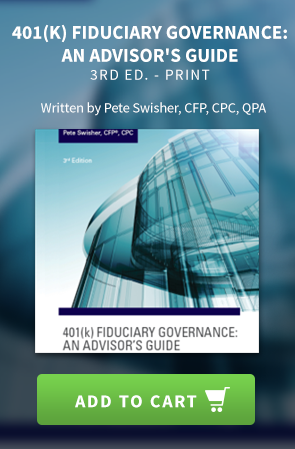State Sponsored Plans
The Green Mountain State and the Centennial State are going to partner in establishing VT Saves, the state-run program that will provide retirement plan coverage for private-sector employees in Vermont whose employers do not.
On June 1, 2023, Gov. Phil Scott (R) signed into law a measure creating...
READ MORE
Retirement plan coverage for certain private-sector employees would expand under measures legislators in Rhode Island and Hawaii are considering.
Securing Coverage in the Ocean State
Increasing private-sector retirement plan coverage in a shifting retirement landscape is a major factor behind...
READ MORE
Well, as they always say, better late than never. I hope you have been able to sleep at night during the last week without the March version of Nate’s Notes being released, but if you have not, never fear, they are here now.
The end of February and all of March were an extremely rewarding time!...
READ MORE
Add private-sector employees in Alaska and Wisconsin to those covered by state-run plans if their employers do not offer a retirement plan. Maybe. And throw in Georgia.
That is, if the governments of Alaska and Wisconsin enact bills that would create state-run retirement savings plans for private...
READ MORE
Washington is the latest state to run a retirement program that will provide coverage for private-sector employees whose employers do not.
On March 27, Pat Sullivan, Executive Director of Legislative Affairs in Inslee’s office, issued an announcement that SB 6069 was among the bills the Gov. Jay...
READ MORE
If bills before both chambers of the Wisconsin legislature are enacted, America’s Dairyland will have a retirement plan marketplace to connect individuals and small employers with retirement plans offered by private financial services firms.
Sen. Melissa Agard (D-Madison) introduced SB 1035 in...
READ MORE
Automatic enrollment of eligible employees in the Hawaii Retirement Savings Program is closer to being put in place.
Sen. Sharon Moriwaki (D-Waikiki) introduced SB2553 on Jan. 19, 2024. Under the bill, employees would no longer be required to opt in to participate in the Hawaii Retirement Savings...
READ MORE
Add the Evergreen State to those that provide retirement plan coverage for private-sector employees whose employers do not. Well, soon.
"In the beginning of March, Washington joined the 15 other states that had previously adopted state auto-IRA language, to provide the best opportunity for small...
READ MORE
Legislation has been entered in the Michigan House of Representatives that would create a retirement program for private-sector employees whose employers do not in the Wolverine State. In the meantime, a bill is before the Minnesota House that would expand coverage under the program they are...
READ MORE
Working for the American worker’s retirement is extremely rewarding and non-stop. February has brought a lot of opportunities to educate in many different directions. From working on Capitol Hill in D.C. to testifying in Washington state, to meeting with individual state legislators in numerous...
READ MORE
Georgia may join sister states in establishing a state-run retirement plan to provide coverage for private-sector employees whose employers do not, if a measure now before the Senate is enacted.
Sen. Chuck Hufstetler (R-52) introduced SB 477 on Feb. 9, 2024. It calls for the creation of the Peach...
READ MORE
The New Mexico Senate is considering a request for a study regarding equalization of teachers’ pensions with those of public employees.
Sen. Mimi Stewart (D-Bernalillo), President Pro Tempore of the New Mexico Senate, on Jan. 18 introduced SM 4, a bill requesting that the Legislative Finance...
READ MORE
A bill before the Mississippi House of Representatives would establish a state-run retirement plan to provide coverage for private-sector employees whose employers do not offer one.
Rep. Orlando Paden (D-Bolivar) on Jan. 24, 2024 introduced House Bill 599, the Mississippi Secure Choice Savings...
READ MORE
Employees would no longer be required to opt in to participate in the Hawaii Retirement Savings Program but rather would be automatically enrolled under legislation now before the Hawaii House and Senate.
Sen. Sharon Moriwaki (D-Waikiki) introduced SB2553 on Jan. 19, 2024; Rep. Andrew Garrett (D-...
READ MORE
Washington—the state, not the city—is considering legislation that would establish a state-run retirement plan to cover those whose employers do not offer one.
If the legislation is enacted, the Evergreen State would join its Pacific Coast neighbors in providing such a plan. California was the...
READ MORE
Rhode Island is on the road to possibly becoming a member of the Secure Choice Club. A bill has been introduced in the state’s House of Representatives that would establish a state-run retirement program that would cover those whose employers do not offer one.
Rep. Evan P. Shanley (D-East...
READ MORE
As we transition from 2023 to 2024, it is easy to look ahead and plan and prepare for the future, especially with things like an amazing NTSA Summit in sunny San Diego in February, as well as navigating the implementation of SECURE 2.0, more retirement legislation on the horizon, the ins and outs...
READ MORE
A report by The Pew Charitable Trusts released on Dec. 22 revealed that state automated savings programs in the United States have collectively reached over $1 billion in assets as of November. This development is part of a broader initiative to assist private sector workers, especially those...
READ MORE
By many measures, CalSavers’ fortunes matched the warm colors of the foliage in Autumn 2023, although some results did not show progress.
CalSavers, as one of the longest-lived state-run programs that provides retirement plan coverage to private-sector employees whose employers do not have a plan...
READ MORE
The rule temporarily reinstating the requirement that employers provide two identifying numbers in order to register with CalSavers could become permanent.
Employers originally had been required to provide (1) their employer payroll tax account number and (2) their federal employer identification...
READ MORE


